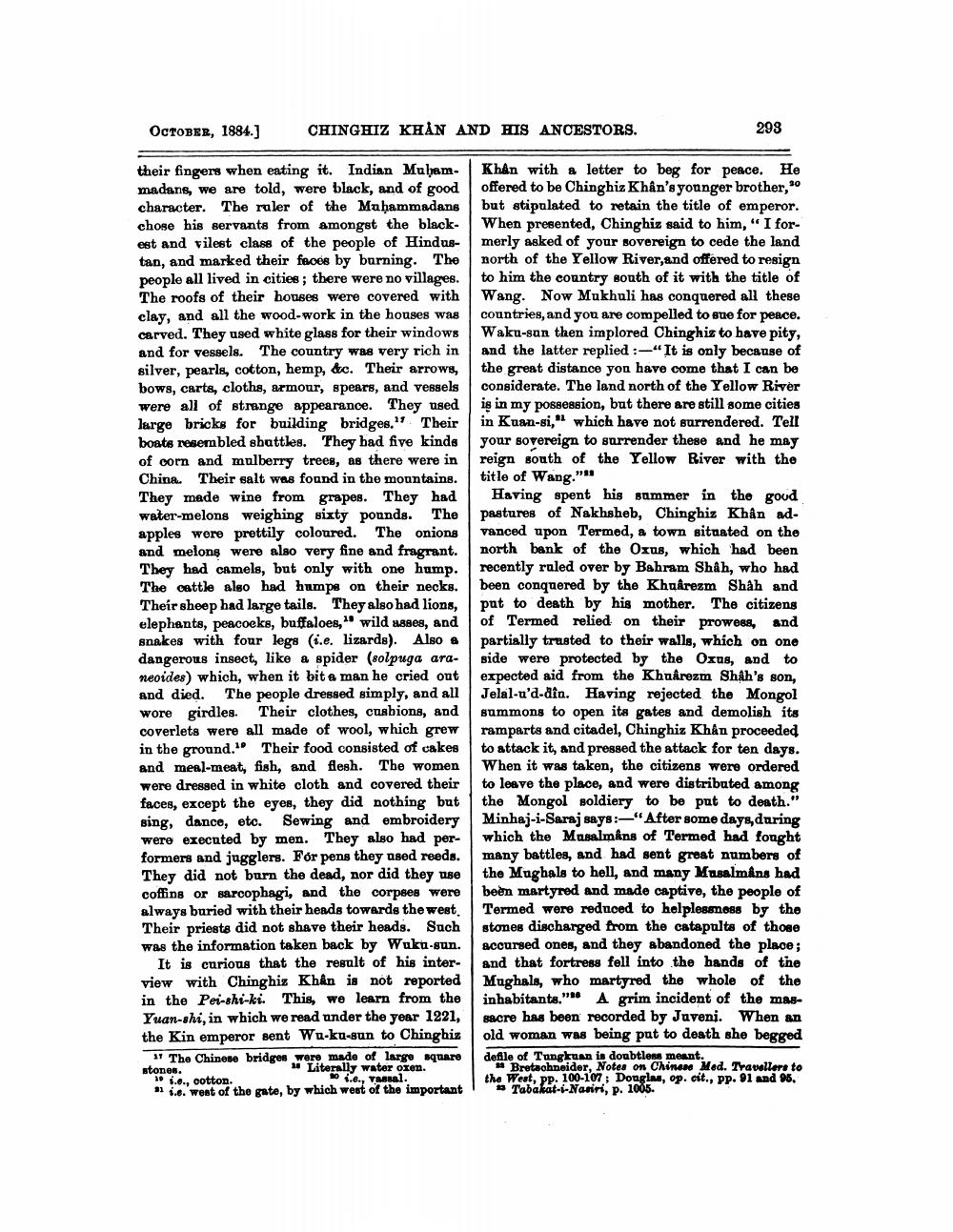________________
CHINGHIZ KHAN AND HIS ANCESTORS.
OCTOBER, 1884.]
their fingers when eating it. Indian Muḥammadans, we are told, were black, and of good character. The ruler of the Maḥammadans chose his servants from amongst the blackest and vilest class of the people of Hindustan, and marked their faces by burning. The people all lived in cities; there were no villages. The roofs of their houses were covered with clay, and all the wood-work in the houses was carved. They used white glass for their windows and for vessels. The country was very rich in silver, pearls, cotton, hemp, &c. Their arrows, bows, carts, cloths, armour, spears, and vessels were all of strange appearance. They used large bricks for building bridges." Their boats resembled shuttles. They had five kinds of corn and mulberry trees, as there were in China. Their salt was found in the mountains. They made wine from grapes. They had water-melons weighing sixty pounds. The apples were prettily coloured. The onions and melons were also very fine and fragrant. They had camels, but only with one hump. The cattle also had humps on their necks. Their sheep had large tails. They also had lions, elephants, peacocks, buffaloes," wild asses, and snakes with four legs (i.e. lizards). Also a dangerous insect, like a spider (solpuga araneoides) which, when it bit a man he cried out and died. The people dressed simply, and all wore girdles. Their clothes, cushions, and coverlets were all made of wool, which grew in the ground. Their food consisted of cakes and meal-meat, fish, and flesh. The women were dressed in white cloth and covered their faces, except the eyes, they did nothing but sing, dance, etc. Sewing and embroidery were executed by men. They also had performers and jugglers. For pens they used reeds. They did not burn the dead, nor did they use coffins or sarcophagi, and the corpses were always buried with their heads towards the west. Their priests did not shave their heads. Such was the information taken back by Wuku-sun.
It is curious that the result of his interview with Chinghiz Khan is not reported in the Pei-shi-ki. This, we learn from the Yuan-shi, in which we read under the year 1221, the Kin emperor sent Wu-ku-sun to Chinghiz
17 The Chinese bridges were made of large square stones. Literally water oxen. 10.e., cotton. 10.e., vassal. 1.e. west of the gate, by which west of the important
293
Khan with a letter to beg for peace. He offered to be Chinghiz Khân's younger brother,20 but stipulated to retain the title of emperor. When presented, Chinghiz said to him, " I formerly asked of your sovereign to cede the land north of the Yellow River, and offered to resign to him the country south of it with the title of Wang. Now Mukhuli has conquered all these countries, and you are compelled to sue for peace. Waku-sun then implored Chinghiz to have pity, and the latter replied:-"It is only because of the great distance you have come that I can be considerate. The land north of the Yellow River is in my possession, but there are still some cities in Kuan-si," which have not surrendered. Tell your sovereign to surrender these and he may reign south of the Yellow River with the title of Wang."
1188
Having spent his summer in the good pastures of Nakhsheb, Chinghiz Khân advanced upon Termed, a town situated on the north bank of the Oxus, which had been recently ruled over by Bahram Shah, who had been conquered by the Khuârezm Shah and put to death by his mother. The citizens of Termed relied on their prowess, and partially trusted to their walls, which on one side were protected by the Oxus, and to expected aid from the Khuârezm Shah's son, Jelal-u'd-din. Having rejected the Mongol summons to open its gates and demolish its ramparts and citadel, Chinghiz Khân proceeded to attack it, and pressed the attack for ten days. When it was taken, the citizens were ordered to leave the place, and were distributed among the Mongol soldiery to be put to death." Minhaj-i-Saraj says:-"After some days, during which the Musalmâns of Termed had fought many battles, and had sent great numbers of the Mughals to hell, and many Musalmans had been martyred and made captive, the people of Termed were reduced to helplessness by the stones discharged from the catapults of those accursed ones, and they abandoned the place; and that fortress fell into the hands of the Mughals, who martyred the whole of the inhabitants." A grim incident of the massacre has been recorded by Juveni. When an old woman was being put to death she begged defile of Tungkuan is doubtless meant.
Bretschneider, Notes on Chinese Med. Travellers to the West, pp. 100-107; Douglas, op. cit., pp. 91 and 95. 23 Tabakat-i-Nasiri, p. 1005.




